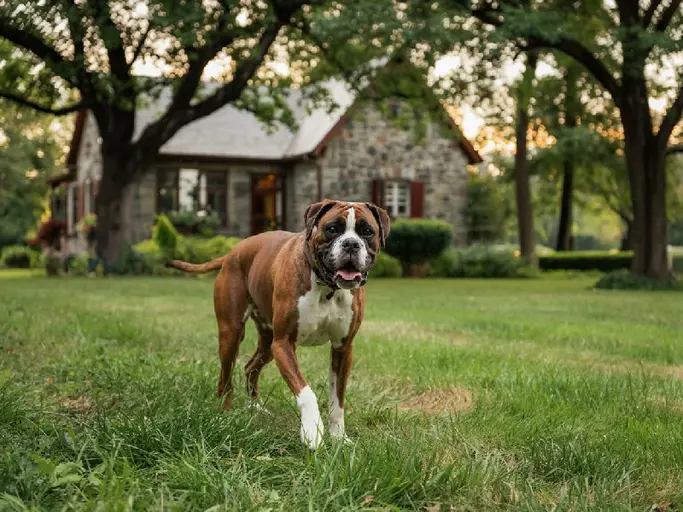Discover the Boxer: A Complete Guide to This Energetic Breed

Brief Introduction
The Boxer is a medium-sized, short-haired breed known for its playful spirit, high energy, and unwavering loyalty. Originating from Germany, the Boxer is a popular choice for families and individuals seeking a devoted and protective companion. They are easily recognizable by their distinctive square jaw, brachycephalic (short-nosed) face, and muscular build. Their goofy personalities and boundless enthusiasm make them incredibly endearing, while their protective instincts make them excellent watchdogs. The Boxer is a truly versatile breed, excelling in various roles from family pet to working dog.
Breed History
Origins and Development
The Boxer’s history can be traced back to 19th-century Germany. They descend from the Bullenbeisser, a now-extinct breed used for bear and bull-baiting. The Bullenbeisser was known for its strong bite force and tenacity, crucial for gripping large prey. Over time, breeders sought to refine the Bullenbeisser, creating a more agile and athletic dog.
Role in the Past
The Bullenbeisser was primarily used for hunting large game, holding the prey until the hunter arrived. Later, as bear and bull-baiting declined, the breed was adapted for use as a butcher’s dog, controlling cattle in slaughterhouses. The Boxer as we know it began to take shape through crosses with breeds like the Bulldog, adding to its intelligence and trainability.
Formation of the Modern Boxer
The first Boxer club was founded in 1895 in Munich, Germany, and the breed standard was established shortly after. Boxers were soon recognized for their intelligence, courage, and trainability, leading to their adoption as police and military dogs. Their popularity quickly spread beyond Germany, and they gained recognition in other countries, including the United States. The American Kennel Club (AKC) recognized the Boxer in 1904.
Appearance
Height and Weight
Boxers typically stand between 21.5 and 25 inches (55-63.5 cm) tall at the shoulder. Males generally weigh between 65 and 80 pounds (29-36 kg), while females weigh between 50 and 65 pounds (23-29 kg). Their muscular build contributes to their overall impression of strength and athleticism.
Coat and Color
The Boxer has a short, smooth coat that is easy to groom. Accepted colors include fawn, brindle, and white markings. Fawn ranges from light tan to deep mahogany, while brindle consists of dark stripes on a fawn background. White markings, often called “flash,” are common on the chest, face, and paws. Boxers with more than one-third of their body white are often referred to as “white Boxers,” and while they are not technically albino, the genetics behind extensive white markings in Boxers can be linked to certain health concerns.
Head and Facial Features
The Boxer’s head is one of its most distinctive features. It is characterized by a broad, blunt muzzle, a well-defined stop (the indentation between the eyes), and a slight undershot jaw. The breed’s expression is often described as intelligent and alert. Traditionally, Boxers had their tails docked and ears cropped. However, these practices are increasingly controversial and are banned or restricted in many countries. Undocked tails are naturally long and can curve upwards. Uncropped ears are floppy and hang forward.
Eyes and Other Features
Boxer’s have dark brown eyes that are expressive and intelligent. Their paws are compact and cat-like, and their body is muscular and well-proportioned. The overall impression is one of strength, agility, and elegance.
Character and Behavior
Temperament and Personality
Boxers are known for their playful, energetic, and affectionate personalities. They are extremely loyal to their families and thrive on human interaction. They are often described as being “eternally youthful” due to their playful antics and unwavering enthusiasm. They make excellent family pets and are particularly fond of children.
Attitude Towards People and Children
Boxers are generally very good with children of all ages. They are patient, tolerant, and enjoy playing games. However, like all dogs, they should be supervised around young children to ensure that both the child and the dog are safe. Boxers are also generally friendly towards strangers, although they can be protective of their families and property. Early socialization is crucial to ensure that they are comfortable around new people and in new situations.
Interaction with Other Animals
Boxers can be friendly with other dogs, especially if they are raised together from a young age. However, some Boxers can be dominant or territorial, so it is important to supervise their interactions with other dogs, especially those of the same sex. They may also have a prey drive and chase cats or other small animals, so caution should be exercised when introducing them to new pets.
Activity Level and Exercise Needs
Boxers are high-energy dogs that require a significant amount of exercise to stay happy and healthy. They need at least an hour of vigorous exercise each day, such as running, playing fetch, or going for long walks. They also enjoy mental stimulation, such as training exercises or puzzle toys. Without adequate exercise, Boxers can become bored and destructive.
Trainability and Intelligence
Boxers are intelligent dogs that are relatively easy to train. They are eager to please their owners and respond well to positive reinforcement methods, such as treats and praise. Consistency is key to successful training. Start training early in puppyhood and continue throughout their lives. They excel in obedience training, agility, and other dog sports.

Care and Maintenance
Grooming Requirements
Boxers have a low-maintenance coat that requires minimal grooming. Regular brushing with a rubber curry brush will help to remove loose hair and keep their coat shiny. They do not require professional grooming or haircuts. Bathing should only be done when necessary, as frequent bathing can dry out their skin.
Exercise and Mental Stimulation
As mentioned earlier, Boxers require a significant amount of exercise to stay happy and healthy. Provide them with daily opportunities to run, play, and explore. In addition to physical exercise, they also need mental stimulation to prevent boredom. Training exercises, puzzle toys, and interactive games can help to keep their minds engaged.
Diet and Nutrition
Feed your Boxer a high-quality dog food that is appropriate for their age, size, and activity level. Follow the feeding guidelines provided by the food manufacturer. Avoid overfeeding, as Boxers are prone to weight gain. Provide fresh water at all times.
Health Considerations
Boxers are generally healthy dogs, but they are prone to certain health problems, including:
- Hip Dysplasia: A condition in which the hip joint does not develop properly, leading to pain and lameness.
- Hypothyroidism: A condition in which the thyroid gland does not produce enough thyroid hormone, leading to weight gain, lethargy, and skin problems.
- Heart Conditions: Boxers are prone to certain heart conditions, such as arrhythmogenic right ventricular cardiomyopathy (ARVC), also known as Boxer cardiomyopathy, and subaortic stenosis.
- Cancer: Boxers have a higher-than-average risk of developing certain types of cancer, such as lymphoma and mast cell tumors.
- Bloat (Gastric Dilatation-Volvulus or GDV): A life-threatening condition in which the stomach fills with gas and twists.
- Corneal Ulcers and Erosions: Due to their prominent eyes, Boxers are prone to eye injuries and corneal problems.
Regular veterinary checkups are essential to detect and treat any health problems early.
Breed Weaknesses
Potential for Aggression
While generally friendly, Boxers can exhibit aggression towards other dogs, especially those of the same sex, if not properly socialized. Early socialization and training are crucial to prevent this.
Loyalty and Dependence
Boxers are fiercely loyal and can suffer from separation anxiety if left alone for extended periods. They thrive on human companionship and need to be part of the family.
Specific Weaknesses
Their brachycephalic (short-nosed) face can make them prone to breathing problems, especially in hot weather. This can limit their tolerance for strenuous exercise in warm climates. They are also prone to drooling and snorting. Because the Boxer is sensitive to heat and cold , they make better house dogs.
Conclusion
The Boxer is a wonderful breed for the right owner. They are intelligent, energetic, and affectionate dogs who thrive on human companionship. They are best suited for active families or individuals who can provide them with plenty of exercise, training, and attention. If you are looking for a loyal, playful, and protective companion, the Boxer may be the perfect breed for you. However, it is important to consider their specific needs and potential health problems before bringing one into your home. Remember to always adopt from reputable responsible breeders or consider adopting from a Boxer rescue organization.
Frequently Asked Questions About Boxer
-
What is a Boxer dog known for?
The Boxer is known for its playful spirit, high energy, unwavering loyalty, and distinctive square jaw.
-
Are Boxers good family dogs?
Yes, Boxers make excellent family pets. They are affectionate, loyal, and particularly fond of children. However, supervision around young children is always recommended.
-
How much exercise does a Boxer need?
Boxers require at least an hour of vigorous exercise each day, such as running, playing fetch, or going for long walks. They also benefit from mental stimulation.
-
Are Boxers easy to train?
Boxers are intelligent dogs that are relatively easy to train. They are eager to please and respond well to positive reinforcement methods.
-
What are some common health problems in Boxers?
Boxers are prone to certain health problems, including Hip Dysplasia, Hypothyroidism, Heart Conditions, Cancer, Bloat (GDV), and Corneal Ulcers.
-
Do Boxers need a lot of grooming?
Boxers have a low-maintenance coat that requires minimal grooming. Regular brushing with a rubber curry brush is usually sufficient.
-
Are Boxers good with other dogs?
Boxers can be friendly with other dogs, especially if raised together from a young age. Supervision is recommended, as some Boxers can be dominant or territorial.
-
Can Boxers tolerate hot weather?
Boxers can be sensitive to heat due to their brachycephalic (short-nosed) face, which can make them prone to breathing problems. Strenuous exercise in warm climates should be limited.
-
Do Boxers suffer from separation anxiety?
Yes, Boxers are fiercely loyal and can suffer from separation anxiety if left alone for extended periods. They thrive on human companionship.
-
Where can I adopt a Boxer dog?
You can adopt a Boxer from reputable responsible breeders or consider adopting from a Boxer rescue organization.

